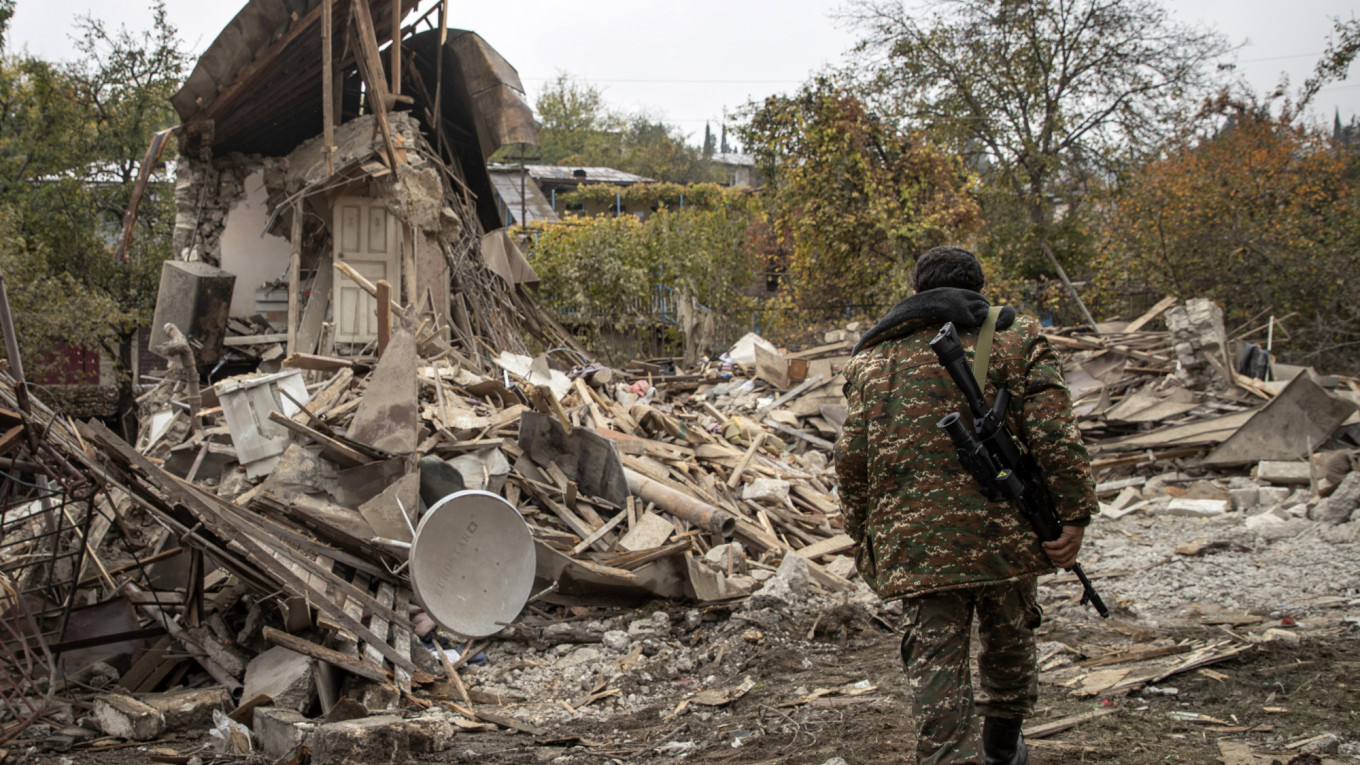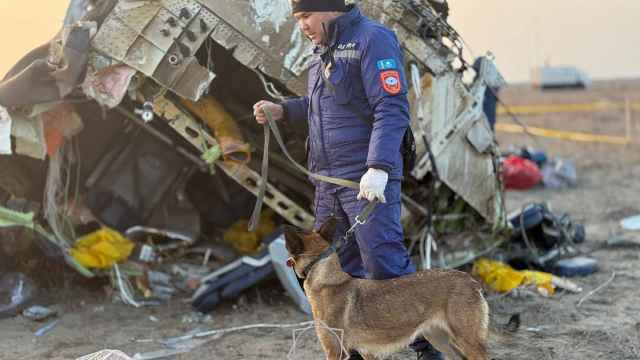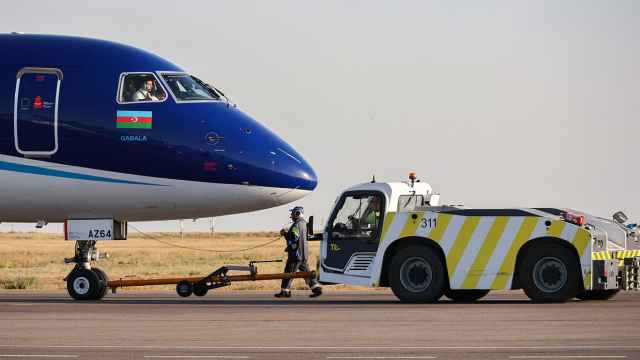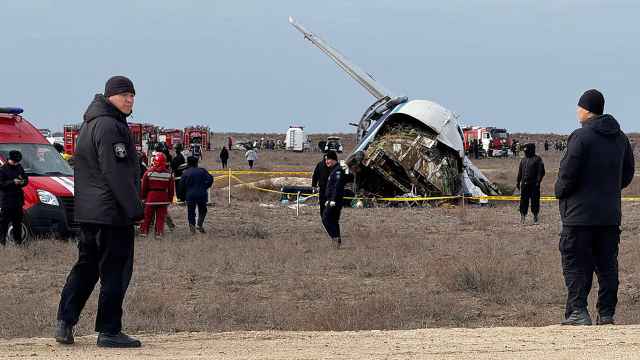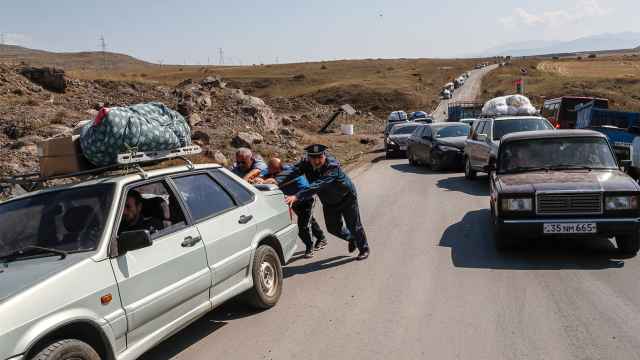Pomegranate harvest is in full swing on a field Zhorik Grigoryan nearly lost in the recent fighting between Azerbaijan and Armenia over the disputed Nagorno-Karabakh region.
Azerbaijani forces were just 50 meters (less than a mile) away from the farmer's land in the eastern Martuni district when a Moscow-brokered peace deal halted weeks of clashes over the restive region and saw the deployment of Russian peacekeepers there.
"There is no fear. (Armenian) soldiers are positioned on the ceasefire line, Russian troops are present," Grigoryan tells AFP, adding: "But we are concerned about the future."
The 73-year-old farmer keeps a watchful eye over a dozen young men from the village of Berdashen as they fill large sacks with the dark red fruit that will be sent to the Armenian capital Yerevan to make juice and wine.
A short distance from the pomegranate field, Azerbaijani and Armenian soldiers are standing guard close to a road that runs from Martuni to Aghdam, a district in the north that Armenian separatists ceded to Azerbaijan.
In late September fresh clashes broke out between the ex-Soviet rivals over Nagorno-Karabakh, an ethnic Armenian enclave that broke from Baku's control in a war in the 1990s.
Under the truce signed on Nov. 9, Azerbaijan reclaimed swathes of territory that for three decades were controlled by Armenian separatists.
New borders
Not far from the road to Aghdam, an Azerbaijani flag attached to a utility pole flutters above a makeshift guard post with only a tent and stacked tyres to protect a handful of soldiers on duty.
On the opposite side, 15 Armenian soldiers have also set up an equally simple camp.
The soldiers watch each other without allowing tensions to take hold.
"There is no problem," says officer Mishik Grigoryan, 45, who is in charge of the post. "We are ready to defend our land."
Some 200 metres away on a strip of concrete, Russian peacekeepers are guarding a checkpoint flanked by armored vehicles.
The new border is marked by one-meter high wooden stakes, their tips painted in red and white.
Like many Armenians, Grigoryan did not welcome the ceasefire agreement that saw separatists lose control of several districts surrounding Karabakh and the historic town of Shusha.
"I am not satisfied with the outcome of the war because we have lost so many people and territories," Grigoryan says bitterly.
His three grandchildren were serving in the military when the war broke out. One of them died, another is in a Yerevan hospital with injuries.
The third is still on duty.
'No means to fight'
Another small camp near the road is manned by a dozen Armenian soldiers between the ages of 18 and 20, who keep watch over the Azerbaijanis from behind a long earthen mound more than two meters high.
Soldier Minas says he was born in Yerevan but migrated to Crimea, a peninsula on the Black Sea that was annexed by Russia in 2014.
Once war broke out, Minas decided to return and join the fighting.
He says he "regrets" the way hostilities ended but adds that it wasn't an equal battle: "It was difficult, we had no means to fight."
He talks about military drones that frequently attacked their positions on the frontline.
Many of his comrades died in the six weeks of fighting that claimed more than 4,000 lives.
Like several of his fellow soldiers Minas is yet to take off his uniform and continues his service for 35,000 drams (73 dollars; 60 euros) a month.
He hopes to get married soon but doesn't know he will be able to leave his post.
Around noon, a taxi drives into their camp bringing sacks of fresh food to the young servicemen.
Minas says one of the soldiers recently had a child: "Today, we are celebrating."
A Message from The Moscow Times:
Dear readers,
We are facing unprecedented challenges. Russia's Prosecutor General's Office has designated The Moscow Times as an "undesirable" organization, criminalizing our work and putting our staff at risk of prosecution. This follows our earlier unjust labeling as a "foreign agent."
These actions are direct attempts to silence independent journalism in Russia. The authorities claim our work "discredits the decisions of the Russian leadership." We see things differently: we strive to provide accurate, unbiased reporting on Russia.
We, the journalists of The Moscow Times, refuse to be silenced. But to continue our work, we need your help.
Your support, no matter how small, makes a world of difference. If you can, please support us monthly starting from just $2. It's quick to set up, and every contribution makes a significant impact.
By supporting The Moscow Times, you're defending open, independent journalism in the face of repression. Thank you for standing with us.
Remind me later.


